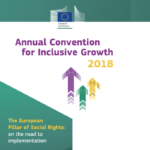EPR engages in Annual Convention for Inclusive Growth 2018 conference
 On April 27th the EPR Secretariat, together with members Fundacion ONCE, Astangu and Heliomare, attended the third edition of the Annual Convention for Inclusive Growth (ACIG) organised by the European Commission. The ACIG aims at connecting non-profit organisations and other stakeholders with policy makers at European level to discuss how to better achieve “inclusive” growth in Europe.
On April 27th the EPR Secretariat, together with members Fundacion ONCE, Astangu and Heliomare, attended the third edition of the Annual Convention for Inclusive Growth (ACIG) organised by the European Commission. The ACIG aims at connecting non-profit organisations and other stakeholders with policy makers at European level to discuss how to better achieve “inclusive” growth in Europe.
Every year, the event is organised around a selected theme. This year’s focus was on the European Pillar of Social Rights. The Pillar is important as it will guide Commission recommendations to national governments, as well as the priorities of the funding programmes. Action oriented, the one-day event gave opportunities for participants to exchange ideas and listen, at the speed dating sessions, to projects developed by some of the organisations attending. Among them was EPR member Heliomare, who presented their programme on Early Vocational Rehabilitation. Michel Edelaar, EPR’s centre coordinator at Heliomare, led this activity.
The ACIG 2018 was introduced by Commissioner Marianne Thyssen, in charge of Employment, Social Affairs, Skills and Labour Mobility, who highlighted that the focus of the next Multi Annual Financial Framework (the EU budget framework including policy priorities for the next five years) should be on investing in people. She pointed out that the next budget should support all the principles contained within the Social Pillar. The Commissioner mentioned the importance of promoting inclusive employment for people with disabilities.
There was a specific workshop on social services. The European Commission explained that they will work more on social services, including the Active Inclusion approach and examining the European Voluntary Quality Framework. The exact work will be decided in consultation with the experts from national governments members of the Social Protection Committee. Conclusions stressed the need to take a person-centred quality of life approach to measuring quality and outcomes of services and empowering users and staff to engage in service improvement as well as the importance of service intergration coordinated at all relevant levels.
A workshop dedicated to European funds had the purpose to brainstorm about how EU funds could be improved, in terms of simplifying the processes. The workshop had presentations from Claude Cahn, from the Office of the United Nations High Commissioner for Human Rights, who proposed a better human rights control in the use of European funding. For example, by linking funding to the concrete needs of national governments on human rights issues. Luk Zelderloo, current president at Social Services Europe, made the point of social services key role in making the Social Pillar a reality as the principles it contains relate to many of the services social services providers deliver. The European Commission, represented by Marie-Anne Paraskevas, explained the different funds currently existing and what could be the new scenarios for the next funding period post-2020.
Conclusions of the day:
More participation of stakeholders is needed together with higher local level involvement; co-production must be at core of development of policies and practices; high level political commitment is needed to push the Social Pillar and its principles; stronger indicators to measure progress in implementing the principles and concrete instruments in legislative and governance measures must accompany this.
- Read the EPR paper on the European Pillar of Social Rights here
- Find the projects and programmes presented in the speed dating session here
- For more information about the conference including presentations please see here



 This website received support from the EPR framework partnership agreement with the European Commission, DG Employment, Social Affairs and Inclusion for 2018-2022 from the EU Programme for Employment and Social Innovation (EaSI). For further information please consult:
This website received support from the EPR framework partnership agreement with the European Commission, DG Employment, Social Affairs and Inclusion for 2018-2022 from the EU Programme for Employment and Social Innovation (EaSI). For further information please consult: